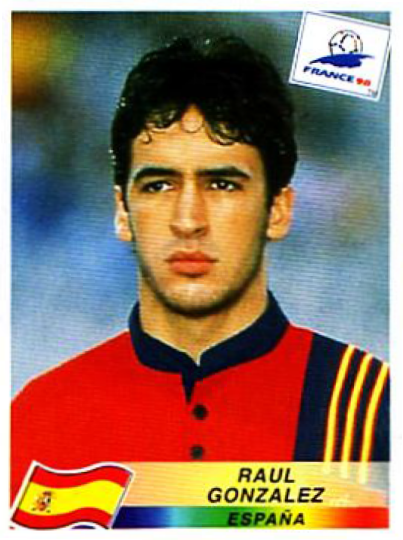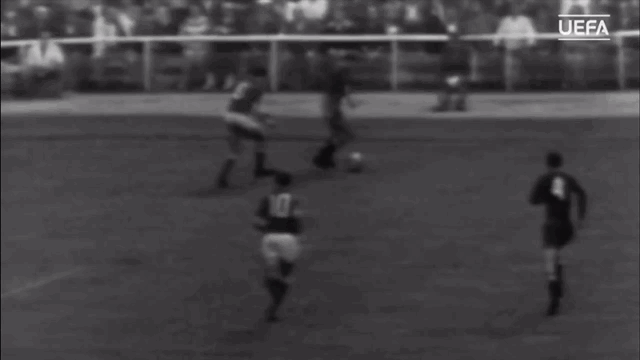To celebrate forty-six years of peacetime and prosperity in Europe, this season we’ll be profiling the footballing history of each remaining member of the EU, looking at some of their most iconic matches and the players that have left a lasting impression on the game. Our penultimate love letter goes out to a nation that is no stranger to suffering, grief, misery, loss and underachievement. They’ve also seen their national team become the undisputed best in the world with three major tournament wins on the bounce, so you’ll forgive us if sympathy is in short supply. VIVA ESPAÑA!
The Player: Raúl

Every nation had their Golden Boy in the nineties. Paul Gascoigne for England in 1990, Roby Baggio for Italy the same year, Patrick Kluivert for the Netherlands, Ronaldo for Brazil, and Michael Ballack, the only member of the Germany squad in 1999 that wasn’t eligible for a free bus pass. For Spain, it was Raúl. A supremely talented footballer who would become the poster boy for a nation’s underachievement.
Raúl’s career could have panned out differently were in not for right-wing nutjob and Atletico Madrid president Jesus Gil’s decision to close Los Colchoneros’ youth academy in 1992. The 13-year-old Raúl had joined the club from the local San Cristóbal setup, winning a youth title with the Atletico Cadete team in his second season. Not ones to miss out on putting one over their neighbours, Real Madrid were quick to snaffle the young forward’s services, adding Raúl to their cantera at La Fábrica the following season. After showing an impressive eye for goal across two years with the youth team, he was promoted to Real Madrid C in 1994, but would only make seven appearances; the sixteen goals scored in this handful of outings was enough to convince head coach Jorge Valdano that this teenager was the Real deal, and Raúl would become the youngest player to represent Los Blancos, appearing as a substitute for Real and Spain’s legendary striker Emilio Butragueño at just 17 years and 124 days old. It would be the beginning of a Roy-of-the-Roversesque career.
The youngster wouldn’t have to wait long for his first goal either. On his home debut at the Santiago Bernabeu, in a Madrid derby no less, Raúl scored the first of 323 goals in a 4-0 victory, and would add a further eight goals before the end of the season to lift the La Liga trophy before his eighteenth birthday, just months after breaking into the reserve team.
By the start of the following season, Raúl was Real’s first choice striker, and though his first full campaign in the senior team would end trophyless, he was still able to impress for the Spanish U21 at the following summer’s European Championships, scoring in the final against Italy, though eventually finishing runners-up. The year would end on a high as he was assigned the #7 shirt at the Bernabeu that he would make iconic over the course of the next fourteen seasons, and was given his full international debut for La Furia Roja in a World Cup qualifier against the Czech Republic. In the next qualifier, against Yugoslavia at Valencia’s Mestalla stadium, Raúl netted his first international goal in a 2-0 win. And still he hadn’t turned 20.
La Liga success in 1997 would be followed by the young striker’s first taste of continental success in the 1997/98 Champions League, with goals against Rosenborg and FC Porto in the group stages helping Los Blancos to their seventh European Cup. That success in Amsterdam was swiftly followed by a trip to France for the 1998 World Cup, as Real Madrid’s golden boy was given his first opportunity to shine on the world stage. Though they hadn’t won an international trophy for thirty-four years, Spain were still considered an outside favourite at the tournament, thanks to their collection of gifted players. As Raúl struck in the opening game against Nigeria to give Javier Clemente’s team a two-goal lead, predictions that they could go far in the competition looked justified, but a late fightback and a glaring error by ‘keeper Andoni Zubizaretta saw the African side steal the win. Though the Spaniards would win their final group game against Bulgaria 6-0, a goalless draw with Paraguay condemned them to an early exit.
That bitter disappointment with the national team would soon become familiar. At Euro 2000, a last minute penalty miss from the striker saw Spain eliminated by France in the quarter-finals, while an injury in the second round prevented Raúl from taking part in the debacle against South Korea at the 2002 World Cup. The qualifying campaign for Euro 2004 did at least bring some personal glory for the forward, as Fernando Hierro’s all-time top goalscorer record fell with a double against Germany, taking Raúl to 30 goals in 59 appearances at the age of just 25. The tournament itself, however, would prove another anti-climax, as Spain were eliminated at the group stage. By 2006, Raúl was no longer an automatic starter for his country, but he still appeared and scored at the World Cup in Germany, though couldn’t prevent a second round exit at the hands of eventual winners France. He called time on his international career on the 6th September 2006 after a shock defeat to Northern Ireland. In his absence, Spain would dominate world football for the next six years.
Back at the Bernabeu the trophies continued to flow, though ironically during his best season in front of goal, Real failed to win anything. Four more La Liga titles between 2000 and 2008 sat proudly alongside European Cup wins in 2000 and 2002, with four Supercopa De Espanas, two Intercontinental Cups and one UEFA Super Cups thrown in for good measure. Having been awarded a “contract for life” in 2008, Raúl went on to break Alfredo Di Stefano’s long-standing goalscoring record for Real, and taking Manolo Sanchis’ appearance record within months. With the club spending heavily on Galacticos like Cristiano Ronaldo, Raúl’s time in the first team was nearing the end, and an injury against Real Zaragoza in 2010 proved to be his last appearance for the club.
A successful spell at Schalke 04 follwoed, with two DfB Pokal trophies added to the Spaniard’s haul, before jaunts to Al Sadd and New York Cosmos saw Raúl bow out of the game. Though he enjoyed a glittering career full of success, it seems a shame that one of Spain’s greatest ever players missed out on their tiki-taka period of dominance. Undoubtedly he finds comfort in his myriad trophies, medals, and records.
The Game: Spain 2-1 Soviet Union, 1964

Spain’s hopes of lifting the inaugural European Championships in 1960 had been thwarted, unsurprisingly, by General Franco. Not usually one to shy away from throwing his support behind a populist pastime like football, the fascist leader took umbrage at the idea of Spain’s quarter-final opponents Soviet Union arriving in Madrid and courting communist sympathies among the locals, and so withdrew the nation from the competition. Given a bye into the final four, the Soviets would go on to become the first team to lift the Henri Delauney trophy, beating Yugoslavia in Paris.
Ironically, four years later Spain would host the final tournament which consisted of two semi-finals and a final spread over the course of four days; a far cry from modern tournaments, where seemingly everyone but Scotland gets to have a go, and the lacklustre low-scoring action drags on across the whole summer. Even more ironically, Franco’s men would make the final and face off against none other than, yep you guessed it, the Soviet Union.
Spain had been earmarked as potential winners in 1960 thanks not only to a group of talented homegrown players that included the likes of Luis Suarez and Ferran Olivella, but could also call on naturalised Spaniards Laszlo Kubala and Alfredo Di Stefano, the jewels in the respective crowns of Barcelona and Real Madrid. By the time the 1964 tournament had rolled around, both Kubala and Di Stefano had retired from international duty, and in their stead arrived the workmanlike Zaragoza striker Marcelino and Real Madrid’s tricky outside right Amancio Amaro. Both would play a part in Spain’s eventual glory.
Unlike recent editions, the hosts of the tournament were expected to compete in the qualification process, with Spain having to trudge through three rounds of two-legged ties to make it to their own party. Romania offered little resistance in the preliminary round, beaten 6-0 in Madrid to secure a meeting with Northern Ireland in the first round proper. A goal from Burnley’s William Irvine had levelled the game in Bilbao after Amaro’s opener, but a second half strike from Paco Gento at Windsor Park was enough to see Spain sneak through to the final round of qualifying. Once there, Pepe Villalonga’s side saw off the other side of Ireland with little fuss, as the Republic were turned over 5-1 in Seville, Amancio and Marcelino grabbing two apiece.
The final tournament saw a revitalised Hungary meet the hosts in the semi-final, still smarting from their shock defeat in the World Cup final ten years earlier, but welcoming a new cohort of talented youngsters into the fold. Of those, the 19 year old Ferenc Bene looked the most promising, a fact supported by his appointment as national team captain, despite being the youngest member of the squad. Despite the quality in the ranks of their opponents, Spain flew out the traps and took a first half lead through Barcelona’s Chus Pereda. It looked to be enough to seal La Roja‘s place in the final, until Bene popped up with an equaliser four minutes from time. Amancio, though, would once again prove his worth in extra-time, netting the winner in the 112th minute. Much to the chagrin of Franco, the Soviet’s 3-0 demolition of surprise qualifiers Denmark meant that communism would be coming to his beloved Santiago Bernabeu stadium.
The final itself was a frantic affair played out in front of almost 80,000 fans in Madrid. In the sixth minute, a swift attack down the right saw Suarez loop a cross into the penalty area, which Pereda chested down and evaded two challenges before lashing the ball past Lev Yashin. Some lax defending and abysmal goalkeeping two minutes later helped the Soviets restore parity, though. A long ball forwards found winger Galimzyan Khusainov in acres of space, and his first time effort caught José Ángel Iribar off guard, squirming beneath the ‘keeper’s body and trickling over the line.
The match was won by another piece of Suarez wizadry on the wing. The Barcelona man turned his marker inside out before aiming a pinpoint cross onto the head of Marcelino, who powered his effort into the bottom corner six minutes from time. Though the team perhaps lacked the identity of their 21st century counterparts, Spain’s 1964 vintage were packed with as much skill, grace and determination as Xavi and co. They were the original Red Fury.